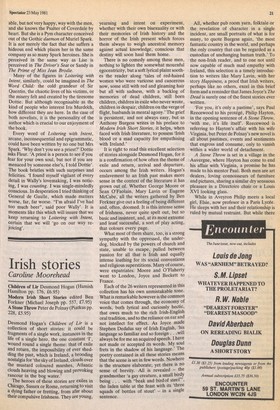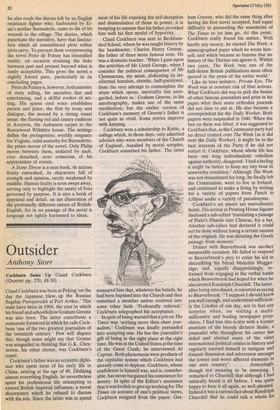Irish stories
Caroline Moorehead
Children of Lir Desmond Hogan (Hamish Hamilton pp. 176, £6.95) Modern Irish Short Stories edited Ben Forkner (Michael Joseph pp. 557, £7.95) A Stone Throw Peter de Polnay (Piatkus pp. 228, 15.95) Desmond Hogan's Children of Lir is a collection of short stories: it could be fragments of a single work, instances in the life of a single hero, the one constant 'I', wound round a single theme: that of exile and return, the impossibility of ever shedding the past, which is Ireland, a brooding nostalgia for 'the sky of Ireland, clouds over the mustard coloured marshes, Atlantic clouds heaving and blowing and provoking rancour in the bog water.' The heroes of these stories are exiles in Chicago, Sussex or Rome, returning to visit a dying father or fretting, from afar about their compulsive Irishness. They are young, yearning and intent on experiment, whether with their own bisexuality or with their memories of Irish history and the horror of the Irish present which forces them always to weigh ancestral memory against actual knowledge, conscious that destiny will soon haul them home.
There is no comedy among these men, nothing to lighten the somewhat mournful egocentricity, but a soft lyrical plaint soothes the reader along 'tales of red-haired women who were varicose and cancerous now, some still with red and gleaming hair but all with sadness, with a backlog of memories of dead children, still born children, children in exile who never wrote, children in despair, children on the verge of flight, husbands in mental agony.' The grief is persistent, and not always easy, but as Anthony Burgess writes in his preface to Modern Irish Short Stories, it helps, when faced with Irish literature, to possess 'Irish blood or a mad capacity for empathising with Ireland.'
It is right to read this excellent selection of stories alongside Desmond Hogan, for it is a confirmation of how often the theme of exile and return, arrival and departure, occurs among the Irish writers. Hogan's enslavement to an Irish past makes more sense in the context of the literature it has grown out of. Whether George Moore or Sean O'Faolain, Mary Lavin or Eugene McCabe, all the writers gathered by Ben Forkner give out a feeling of being different and, often, doomed. It is this intense sense of Irishness, never quite spelt out, but so basic and insistent, and, at its most extreme and least successful, a sort of play acting, that colours every page.
What most of them share, too, is a strong sympathy with the oppressed, the underdog, blocked by the powers of church and state, unable to escape, pulled between passion for all that is Irish and equally intense loathing for its social conventions and religious superstitions. Many of course, were expatriates: Moore and O'Flaherty went to London, Joyce and Beckett to France.
Each of the 26 writers represented in this collection has his own unmistakable tone. What is remarkable however is the common voice that comes through, the economy of words, both lyrical and curiously hectic, that owes much to the rich Irish-English oral tradition, and to the reliance on ear and not intellect for effect. As Joyce made Stephen Dedalus say of Irish English, 'his language so familiar and so foreign. . .will always be for me an acquired speech. I have not made or accepted its words. My soul frets in the shadow of his language.' The poetry contained in all these stories means that the scene is set in few words. Nowhere is the structure elaborate; yet there is no sense of brevity. All is revealed the grandmother `a gay creature, a small birdy being . . . with "beak and bird of steel", the laden table at the feast with its three squads of bottles of stout' — in a single sentence. All, whether pub room yarn, folktale or the revelation of character in a single incident, are small portraits of what is for many, to quote Burgess again, 'the most fantastic country in the world, and perhaps the only country that can be regarded as a custodian of unchanging human truth.' To the non-Irish reader, and to one not until now capable of much mad empathy with Ireland, this selection is a timely introduction to writers like Mary Lavin, with her story Happiness, a proof that Irish writers, perhaps like no others, excel in this brief form and a reminder that James Joyce's The Dead is surely one of the finest stories ever written.
`For you, it's only a pastime', says Paul Reecewood to his protégé, Philip Hayton, in the opening sentence of A Stone Throw, 'with me, it's life itself'. Reecewood is referring to Hayton's affair with his wife Virginia, but Peter de Polnay's new novel is all about pastimes, events and sentiments that engross and consume, only to vanish within a wider world of detachment.
A Stone Throw is set in a village in the Auvergne, where Hayton has come to end his affair with Virginia, a promise he has made to his mentor Paul. Both men are art dealers, loving connoisseurs of furniture and pictures, sharing a similar dry sensuous pleasure in a Direetoire chair or a Louis XVI looking glass.
While in Aveyron Philip meets a local girl, Elsie, now profesor in a Paris Lye& He sleeps with her and their relationship is ruled by mutual restraint. But while there he also reads the diaries left by an English resistance fighter who, harboured by Elsie's mother Bernadette, came to die of his wounds in the village. The diaries, which punctuate the narrative, have that fascination which all remembered plots within plots carry. To prevent them overpowering the novel Peter de Polnay has intensified reality, on occasion straining the links between past and present beyond what is easily acceptable. This gives the novel a slightly forced pace, particularly in its concluding pages.
Peter de Polnay is, however, both a master of story telling, his narrative fast and entertaining, and a skilful evoker of setting. His sparse cool voice establishes person and place, the first by irony and dialogue, the second by a strong visual sense: the flaming red and canary cushions in Aveyron, the Aubusson carpet in the Reecewood Wiltshire house. The settings define the protagonists: worldly elegance for Virginia, solid austerity for Bernadette, the prime mover of the novel. Only Philip moves between them, seduced by each, ever detached, ever conscious of his appreciation of events.
A Stone Throw is a neat book, its actions firmly enmeshed, its characters full of strength and opinion, rarely weakened by muddle. Human frailty is soon swept away, serving only to highlight the sanity of lives governed by purpose. It is also a book of appraisal and detail, an apt illustration of the profoundly different nature of BritishEnglish, for in no passage of the novel is language not tightly harnessed to ideas.











































 Previous page
Previous page